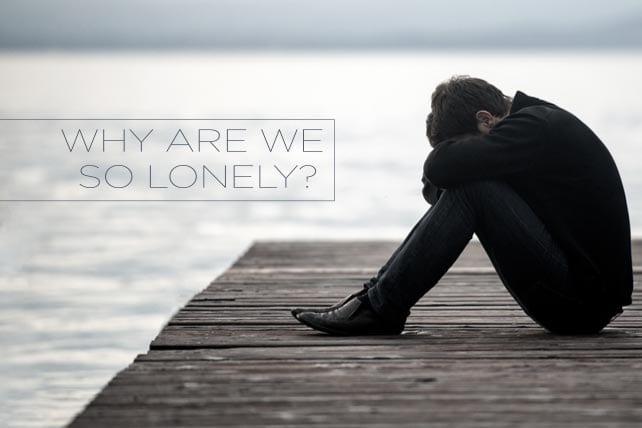I was sitting with some friends recently, and we asked, “What is one of your most significant childhood moments?” We began with talk about memorable Christmas gifts and trips we had taken. But inevitably, the conversation turned to significant moments shared with our friends: time spent together building forts, trekking through vacant lots and discovering life together. There was an innocence about all of it that allowed us to connect deeply through the play of life.
All this came to mind as I was reading an article by the Good Men Project, which presented this statistic.
In a survey published by the AARP in 2010, we learn that one in three adults aged 45 or older reported being chronically lonely.
Why Are We lonely?
As children, relationship is a primary pursuit. We’re freed to engage with other kids. Our environments leave room for play and conversation. Everything is about exploration and expectation. And most of what we do is in groups.
But as we grow older—especially for men—autonomy and disconnection are seen as the highest forms of virtue. Doing things on our own and not relying on others has become some sign of maturity and masculinity. It elicits images of the lone ranger, cowboys and superheroes.
The superhero saves the world, but his inevitable thorn is loneliness.
And so we build our lives—and ultimately our society—on transience and the chasing of dreams. It’s built on the pressure of performing and proving our worth based on our merit and accomplishment.
In this, we reduce our significant relationships to a single person and relegate our other relationships to the peripheral. Romance is lovely. It is to be celebrated and enjoyed.
Marriage is wonderful. But a spouse is not meant to take the place of the village.
One day, we all wake up to discover:
We’re all so busy proving that we are worthy of being loved until, eventually, we realize the only thing we’re not alone in is our loneliness.
The Danger of Disconnectivity
This disconnection from close, platonic relationships ultimately proves to be deadly.
In a six-year study of 736 middle-aged men, attachment to a single person (almost always a spouse) did NOT lower the risk of heart attack and fatal coronary heart disease, whereas having a strong social support network did. [Source: Kristina Orth-Gomér, Annika Rosengren & Lars Wilhelmsen, “Lack of Social Support and Incidence of Coronary Heart Disease in Middle-Aged Swedish Men,” Psychosomatic Medicine, 55(1993): 37-43.]
The same article from the Good Men Project referenced above contains another poignant statistic related to loneliness from the New Republic:
Emotional isolation is ranked as high a risk factor for mortality as smoking. A partial list of the physical diseases thought to be caused by or exacerbated by loneliness would include Alzheimer’s, obesity, diabetes, high blood pressure, heart disease, neurodegenerative diseases and even cancer—tumors can metastasize faster in lonely people.
Commit to the Village
For millennia, humans have been communal creatures. We have lived alongside one another in life-long connectivity. Today, autonomy and disconnection are the ways of life. Depending on others and planting ourselves deeply in them are seen as liabilities—signs of weakness—more than they are seen as virtues.
The solution to our loneliness? Commitment.
Several years ago, I wrote an article called “Pressing Through the First 1/3.” It talks about our obsession with the flashiness of new and our constant jumping from one person and place to another because of the fear of missing out. In that article I wrote,
Our addiction to the high of the first 1/3 has kept many of us from reaching the true depths of relationship that you and I are created to experience.
The truth is:
Relationship is difficult, yet essential. We must choose long-term sacrifice and commitment.
For the ancients, this was most often a non-issue. When things got tough, they couldn’t get in a car and drive away. They couldn’t get on a plane and fly to another city. In fact, when they woke up the next morning, they would walk out the front of their huts and see the people with whom they had difficulty face to face. Today, this kind of commitment takes decision, but it’s an imperative decision.
Another thing we learn from the village is perspective.
When we recognize the value of relationship, we no longer live solely for the good of ourselves. We live for the good of the whole.
Our wellbeing and worth are not defined in the context of individuality. Our wellbeing, health and fulfillment are directly connected to the good and wellbeing of the people surrounding us. This reminds us that:
The most important thing in life is relationship.
Now What?
Maybe it’s time to re-evaluate our priorities. One of the things I’ve discovered this year as I’ve considered relationship in my own life is this: I love and am drawn to ambitious people. I’m challenged by them. I’m inspired by them. I get life from the energy they exude. But being drawn to ambitious people can really lead to a lonely life. We’re all off pursuing our dreams and passions and miss the deep connection we’re created for.
Our ambitions MUST come second to our ambitious pursuit of one another.
I have friends who have done and will do lots of amazing things. And in my conversations with them, one thing is clear. None of it matters when we’re disconnected from one another.
So today, put people first. And tomorrow, when they’re difficult, put people first. And when you get the itch for something new, put people first. And when you think your career necessitates giving up everyone you love, put people first.
Pursue the ones you love with steadfastness and longevity.













